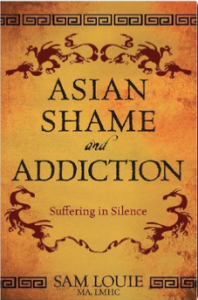5 Facts about Asian-American Shame
Sam Louie (M.A., Clinical Psychology) is a therapist and speaker near Seattle, WA. He published Asian Shame and Addiction and Asian Honor, and blogs at Psychology Today.

As a therapist specializing in shame and addictions within the Asian-American culture, here are 5 areas of shame that I see plaguing the Asian-American community.
1- Conditional Love: Many Asian-Americans, including Christians, develop a distorted image of self and God due to the cultural emphasis on higher education, career, relationships, etc. Their ability to love themselves unconditionally is compromised. They suffer from low self-esteem and struggle with the “good enough” complex (i.e. “Am I good enough?”)
2-Shame of Dishonoring the Family: Simply sharing the realities of one’s upbringing can feel dishonoring and shaming to the family. So, many Asian-American clients early in therapy will simply state, “My parents did the best they could,” without honestly confronting the grief of neglect. This is a significant hindrance in therapy; the inability to be “real” with one’s emotions leave many without the skills of emotional intimacy.
3-Security Based on Idols: Asian-Americans find their security in a number of cultural idols: prestige, affluence, academic success, financial success, professional success, marital success, etc. Due to the immigrant experience, success and financial security are often intertwined. Asian-Americans often are driven to find their security in these idols instead of relying on the Lord.
4-Repentance Requires Acknowledgment: Repentance in the Christian community requires acknowledgment of one’s sins. But in an Asian church where culture may supercede Christ, the acknowledgment of one’s depravity and fallenness may not get addressed. For example, the need for financial security may make it difficult for Asian-Americans to tithe. A client may tithe and feel he/she’s trusting God only to realize later this is an area that conflicts with the family message to save money.
5-Shame Isn’t Guilt: When clients experience shame they may think they’re experiencing healthy guilt or repentance. This illegitimate shame breeds shame, and does nothing to draw one closer to God. It is about self-punishment and looking inward. A healthier approach focuses on remorse and reconciliation—looking outward to restore relationships vs. feeling like one is undeserving of relationships. But shame-based Asians struggle to accept forgiveness and get stuck in a cycle of judgment.
The 6 Types of Shame
Asian-American clients often believe they are flawed, defective, and inadequate, either in their own eyes or the eyes of those around them. These negative thoughts emanate from these 6 distinct areas. The following quotes are examples from Asia-American clients I have counseled.
- Academic Shame, for not getting good enough grades. “My mom did a lot of shaming on me and my brother. Mom was super smart and said, ‘I was number one in everything, why aren’t you?’ “
- Physical Shame, for not being ‘white’ enough. “I was teased by white friends about my eyes…they would say things like ‘slanted eyes’ or ‘can you really see?’”. Due to the pressure to conform to Western standards of beauty, it’s no wonder why so many Asians are having double-eyelid surgery and other procedures.
- Emotional Shame, for not controlling negative emotions. One mother said about her suicidal son, “To me he’s weak and I tell him he should be strong, a lot of kids grow up with single-parent households. I say if he wants to commit suicide, “go do it”!
- Religious Shame, for not earning God’s love. “I had an abortion, I know God must hate me since I did such an awful thing”. This college-aged student never shared this with anyone in her family for fear of judgment and ostracism.
- Behavioral Shame, for not living up to expectations. “My sister switched from a business career to one in music and my parents weren’t happy. They wouldn’t go to her shows or listen to any of the songs she produced. Professionally, they don’t care about what she does and I don’t want that to happen to me.” This client remained in his field of engineering to receive his parent’s blessing and acceptance.
- Cultural Shame, for one’s ethnic background or customs. “Kids made fun of me for speaking Chinese so I made sure to never speak it in public. When my parents spoke in Chinese, I spoke back in English.”
Overcoming the Shame 
What we can do as individuals, communities, or churches is to exemplify the decision to put Christ above culture. In therapy, I tend to share more about my own life (therapeutic disclosure) then I would with a traditional client. If you are in a position of power (clergy, teacher, etc.), you are considered an authority figure and may garner more respect if you are willing to help shame-based people experience your ability to be emotionally vulnerable. In church settings, there may even be small group opportunities to talk about the process of shame and how it inhibits people from sharing.
In therapy we call this talking about process behind the subject matter. Instead of pressuring people to share uncomfortable aspects about themselves, we might first start off with conversations regarding what it would be like to talk about those topics (i.e. the feelings behind those topics such as feeling judged, shamed, excluded, etc.). This is rich in itself and can often foster more trust and growth than simply feeling forced to share about topics one may not be ready to share.
Finally, going back to the Word and helping Christians realize what elevating Christ above culture looks like by emphasizing how the blood of Christ has paid the price for our shame. It also helps to link shame-based people from similar backgrounds (i.e. dealing with divorce, bankruptcy, sexual addictions, etc.) together so they know they’re not alone.

So true. This is one of the areas we would like to do more in relation to counseling and shame in Africa also. Thanks for posting this. I’m looking forward to reading more of his work.